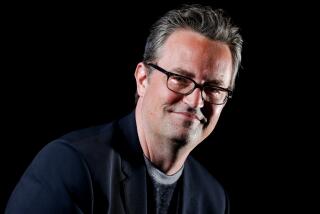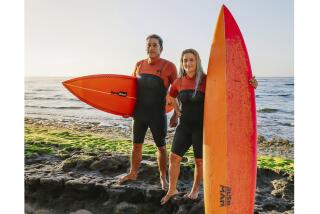Marine’s Mission Is to Stop Substance Abuse : Military: Master Gunnery Sgt. Howard J. Perry overcame alcoholism in 1975 and has since helped innumerable brothers in arms vanquish their addictions.
- Share via
EL TORO — If the Marines had a reputation as the hardest-drinking branch of the armed forces, Master Gunnery Sgt. Howard J. Perry worked hard for almost 13 years to help them earn it.
At his peak in 1975, he estimates, he was drinking two cases of beer a day chased with sedatives conned out of Navy doctors. And when the bottle was dry, he drank mouthwash and watered-down rubbing alcohol--”anything,” he said, “to make me feel good.”
But the Marine Corps has changed, and so has Perry. With the ranks fast becoming the few, the proud and the sober, he has done more than his share to reduce substance abuse among his brothers in arms from Okinawa to Quantico, Va.
Perry, 46, who took his last drink more than 15 years ago, is the most senior drug and alcohol counselor in the U.S. Department of Defense and helps run one of the most vigorous drug and alcohol programs in the military at El Toro Marine Corps Air Station.
Since his release from a Navy rehabilitation center, which he entered in a straitjacket, Perry has devoted his life to saving the greenest privates and toughest Leathernecks from addictions certain to ruin their lives.
Thousands of officers and enlisted men have passed through his programs, where Perry breaks them of their excesses with the aggressiveness of a drill sergeant and the kind of empathy that comes from personal experience. At El Toro and elsewhere, he is father to even the hardest cases.
“Perry is highly respected and well-known in the Marine Corps,” said Cmdr. James B. Calvin, a longtime friend and Navy psychologist who helped treat Perry for alcohol addiction in 1975. “He will go after anybody. He’ll go for what he believes in, and he doesn’t care if they have stars on their collar.”
Perry, a fast-talking Marine from Billerica, Mass., now supervises the counseling of hundreds of Marines a year and oversees the testing of 1,500 urine samples a month from 17,000 troops at facilities in Tustin, El Toro, Camp Pendleton and Yuma, Ariz.
The Marines have adopted strict prohibitions against drugs, and those caught using drugs generally face dismissal. Drinking has been curtailed by restrictions on happy hours, the types of drinks served on bases and increasingly severe punishments for drunk driving.
Department of Defense statistics show alcohol consumption in the Marine Corps has been reduced almost 30% since 1980. Over the last five years, those testing positive for drug use at El Toro have dropped from five per 1,000 Marines to less than four per 1,000.
From the beginning, Perry has been part of the improvement and has seen both sides of the problem--first as an alcoholic himself, then as a counselor who became instrumental in setting up some of the first substance-abuse programs in the Marine Corps.
The product of alcoholic parents and sexual and physical abuse as a child, Perry was a textbook case of alcoholism, he said, until a colonel who acted more like a father than a Marine ordered him into treatment against his will.
Perry recalls that he started drinking when he was 3 years old, fetching beer for his grandfather while he listened to Boston Red Sox games on the radio. “I’d take little sips off the bottle as I walked from the kitchen,” he said.
“By the time I was 17, my drinking was out of hand,” Perry recalled. “My parents told me I should have never been born. They called me a bum and a failure, someone who would never amount to anything. I couldn’t even get a date because I had cavities across my front teeth. I drank to drown the pain.”
Perry enlisted in the Marines at 19 and was assigned to some of the hardest-drinking commands from Camp Lejeune, N.C., to Vietnam. In those days, happy hours at base clubs offered discounted drinks. Nearby towns seemed to have enough bars to slake the thirst of a division. Marines weren’t Marines unless they were two-fisted drinkers, and the corps tended to look the other way as long as troopers weren’t derelict in their duties.
Perry’s alcoholism peaked in 1975 at Quantico Marine Base, the hub of training for the corps. He was arrested nine times for drunken driving and seven times for reckless driving in 18 months. Police often found him passed out behind the wheel of his parked car.
He was banned from the town of Quantico for writing bad checks, he says, and he bought three houses in Virginia under false pretenses. To make matters worse, he had remarried when the divorce from his first wife was not complete.
“I just didn’t give a damn anymore,” Perry said. “My life was dysfunctional. I was the adult child of alcoholic parents. I owed everyone. People were looking for me all over the world . . . .”
Absent without leave, facing possible criminal charges and his body rejecting solid food, Perry finally turned himself in to his commanding officer on April 10, 1975, a date he now recalls with complete clarity.
Eventually, he was put in shackles and a straitjacket for an ambulance ride to an alcohol treatment center at Bethesda Naval Hospital in Maryland. Withdrawal followed. DTs. The shakes. Despite it all, he denied he was an alcoholic for 8 1/2 weeks.
Although he took twice the normal time, Perry successfully completed treatment and was reinstated to active duty. A panel of high-ranking officers, however, told him that he would never be promoted beyond gunnery sergeant, something he has since overcome.
“I came to believe that you have to swallow pride,” Perry said, “and when you come to grips with it and be honest with yourself, you will get better. But you have to keep at it. The day I say I am well altogether is the day you will see me back in the street.”
Today, Perry is one squared-away Marine. He can see himself in the shine of his shoes. His olive-drab pants and khaki shirt are neatly pressed. His haircut is regulation high and tight. The only remaining sign of addiction is a pack of cigarettes he carries in his left sock.
“Howard is firm but fair,” said Master Gunnery Sgt. William E. Colby, who is stationed at the Navy Alcohol Rehabilitation Center at Miramar Naval Air Station in San Diego. “Howard will give you the shirt off his back, but if he thinks you need to be hung up wet, he will. If you need to get hit in the middle of your head, he will hit. He is not a man to take lightly.”
The alcoholics and drug users he counsels know this, and if they don’t, they soon find out. Eventually, his colleagues say, he will get them to hang out their dirty laundry and willingly admit that they soiled it.
It doesn’t matter if they are privates or rear admirals, because in treatment, Perry says, every Marine is the same and the distinctions of rank and formal courtesies he extends to officers under normal circumstances disappear.
“He is particularly good at ripping them apart and getting down to the bone,” said Maj.-select John A. Thomas, one of Perry’s former commanders. “He has to be. You know you got a guy with four DUIs in a short time and they don’t want to say they have a drinking problem. You have to overcome that before you can get anywhere.”
One of those was Maj. Rock Rhyne, a 20-year veteran now stationed at the Marine Corps Logistics Base in Barstow. He first met Perry at a Marine Corps facility in Norfolk, Va., in 1979, when a staff sergeant in his command had troubles with alcohol.
“He somehow sensed I had a problem too,” Rhyne said. “He gave me the ‘Big Book,’ the Alcoholics Anonymous manual. On the front flap, it said ‘Love, K.I.S.S., Howard.’ K.I.S.S. stood for ‘Keep it simple, stupid.’ My wife saw that and wondered, ‘Who is this guy?’ ”
After being transferred to Okinawa in 1982, Rhyne, then a captain, was referred by his commanding officer to the alcohol rehabilitation center. His counselor: Perry.
“His first words to me were: ‘I knew I would see you again,’ ” Rhyne said. “ . . . I recall I didn’t like him at first. People either love him or hate him. But after they get over the first three to four weeks of treatment, they find out he cares and doesn’t want anything in return. He is probably the most inspirational person for me.”
In the years since his own release from treatment, Perry has returned to some of the bases where he used to drink. But instead of booze, he carries substance-abuse brochures and checks into the drug and alcohol rehabilitation centers instead of the noncommissioned officers club.
At Quantico, he helped establish a substance-abuse prevention center and the first Alcoholics Anonymous meetings. He also volunteered his services to Marines who sought help.
In 1983 and 1984, Perry was instrumental in rebuilding the drug and alcohol center at New River Marine Corps Air Station in North Carolina, where he initiated a family service center and a program for teen-agers. Both projects ended up helping about 2,600 Marines a year.
He has handed out scores of toys at Christmas to the children of recovering alcoholics, and his speeches about his own battle with booze has moved audiences to tears at Marine assemblies and support groups for those in treatment.
“Howard’s hours are amazing,” Rhyne said. “If there was any incident, 24 hours a day, they would call him, and he would be in. When someone got drunk, when there was a family dispute, he was there, and he looked after the family, not just the Marine. The examples are endless.”
Perry helps run El Toro’s programs from Building 279, an austere, beige structure near the end of a runway where the peace and quiet is routinely pierced by the screaming engines of F-18s. His office is filled with awards and mementos of his work and life. A sign on the wall says “Sometimes the wrong things begin to take control.” Above the saying is a picture of a whiskey bottle, a glass of wine and a beer mug.
Above his desk, Jesus Christ prays in a painting and an F-4 Phantom jet fighter refuels in midair in a photograph. A wooden heart, painted red, hangs on the wall, and a plaque says “God, Serenity, Courage, Wisdom.”
Other plaques carry unit insignia. There are a U.S. Navy League Award, a personal commendation from former Marine Corps commandant P.X. Kelley and a photo of Gen. J.A. Studds inscribed “With deepest professional respect.”
But Perry keeps his favorite form of appreciation in his cramped quarters on the base. “Come on in. I want to show you this,” he says, unlocking the door to his room.
In a studio apartment not much bigger than a suite at Motel 6 are dozens of stuffed bears. They line the headboard of his bed and overpopulate the dresser. They sit in his easy chair and poke their heads out of book cases. A couple of them bracket two samurai swords cradled in a pair of deer antlers.
There is hardly room left for a few sticks of furniture and half a dozen brown grocery bags filled with Perry’s collection of glass floats lost from the nets of Japanese fishermen off Okinawa.
The bears, some with ribbons that say “Hug Me,” are gifts from civilians and other Marines he has either helped in treatment or sponsored for Alcoholics Anonymous.
In the evening, Perry retires here, surrounded by his stuffed animals. “Every night I say a prayer,” he said. “I lay my head on the pillow and thank God for a most beautiful day, although I might have screwed it up. But I got through it without a drink.”



